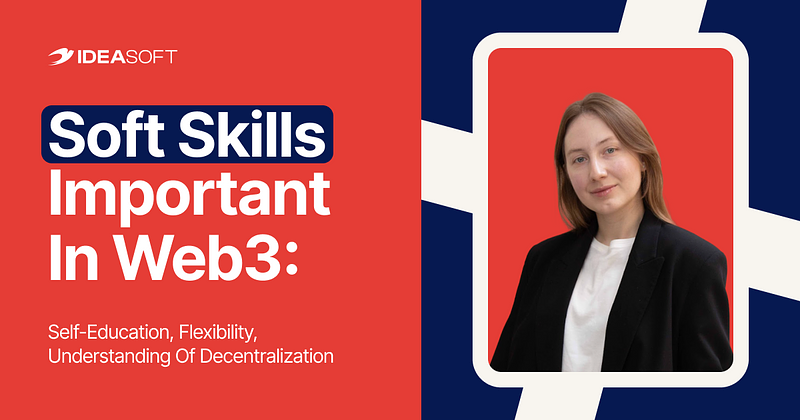
Soft skills important in Web3: self-education, flexibility, understanding of decentralization
In today’s tech world, a specialist’s success is defined not only by their knowledge of programming languages or ability to write flawless code. Soft skills — the interpersonal and cognitive abilities that enable quick learning, flexible thinking, and effective collaboration — are playing an increasingly important role. This is especially evident in the Web3 space, where technologies evolve at lightning speed, standards are constantly shifting, and community expectations grow more complex. In this environment, soft skills often become the decisive factor that separates a good professional from a true industry leader.
Soft skills are gradually ceasing to be merely a “supplement” to technical competence — today, they increasingly define a specialist’s success in the tech field. Numerous studies confirm this:
- According to Harvard Business Review, 71% of employers say they value soft skills more than technical knowledge and abilities.
- The Tech Hiring Trends 2025 report shows that 92% of recruiters believe soft skills carry the same weight as hard skills.
- In the IT sector, more than 24% of job postings already list communication skills as one of the key requirements for successful work.
- And according to TRVST, 93% of employers describe soft skills as “very important” or even “essential” when hiring specialists.
These figures clearly illustrate a key trend: while technical knowledge remains the foundation, it is the ability to learn quickly, think flexibly, communicate effectively, and work well in a team that distinguishes a good specialist from a true professional. In the rapidly evolving Web3 environment, where change happens at an unprecedented pace, these qualities are not just an advantage — they are a necessity.Self-learning — the driving force in Web3Web3 is a constantly changing world: new blockchains, new protocols, new standards. That’s why the ability to learn independently is a key advantage.
- Among the skills that will become critically important in Web3 by 2025, continuous learning is one of the key ones.
- A study on serverless practices found that “continuous learning and adaptability” are among the six most in-demand soft skills.
- Learning formats that promote the development of soft skills through practice — such as hackathons — show that participants experience growth in creative thinking, collaboration, and the ability to apply knowledge.
How to Develop Self-Learning
- Continuously read whitepapers, technical documentation, and reviews of new Web3 projects.
- Adopt a project-based approach: run small experiments — write smart contracts, deploy them, and test their functionality.
- Join communities, forums, and Discord groups — ask questions and share knowledge.
- Use courses, microlearning resources, technical blogs, and videos.
Flexibility in a Decentralized EnvironmentWeb3 projects often change direction: redesigns happen, tokenomics evolve, and protocols get updated. In such an environment, stability is a myth — and flexibility is a real asset.
- Hackathons as an educational format demonstrate that flexibility and interdisciplinary collaboration grow when people work under time pressure and uncertainty.
- In a study of serverless practitioners, adaptability was highlighted as one of the key soft skills required for various roles.
- A Harvard Business Review study emphasizes that today, fundamental skills — such as collaboration, adaptability, and mathematical thinking — can prove more important than narrow specializations.
How to Train Flexibility
- Work on projects with constantly changing requirements.
- Learn to let go of established approaches and try new ones.
- Keep notes on what worked and what didn’t; analyze and adjust your approach accordingly.
To become a true professional in the Web3 space, it’s not enough to simply understand how blockchain works — you need to think within a decentralized paradigm. Decentralization is not just a technical architecture; it is, above all, a culture built on autonomy, trust, and active community participation. Understanding how DAOs operate, how decision-making mechanisms function, and how interaction unfolds in decentralized systems forms not just an additional skill set but a coherent value system that helps you navigate the Web3 ecosystem. That’s why skills such as community building, effective communication with participants, and creativity are increasingly seen as key expressions of decentralized thinking.
These three key soft skills in Web3 — self-learning, flexibility, and understanding of decentralization — are closely interconnected and mutually reinforcing. Self-learning enables professionals to continuously absorb new standards and protocols, creating the foundation for further adaptation and supporting flexibility in their work. Flexibility, in turn, allows them to quickly apply new knowledge in practice and operate effectively in different contexts, especially when projects or cyber infrastructure undergo changes.
Finally, understanding decentralization shapes the right mindset, guiding both the self-learning process and adaptation in the right direction — one rooted in the principles of autonomy, community participation, and interaction with DAOs. Together, these skills form a solid foundation for growth and success in the dynamic world of Web3.
Other Important Soft Skills in Web3
- Communication. According to LinkedIn, communication remains the most in-demand skill across job postings. In the Web3 space, it holds particular importance: decentralized teams often work in distributed formats, spanning different time zones and cultural contexts. As a result, the ability to convey ideas clearly, structurally, and transparently becomes a decisive factor for successful collaboration and project outcomes.
- Critical Thinking / Analytics. The report “«What Soft Skills Are Employers Looking For in 2025?»highlights analytical thinking and adaptability as some of the most universally valued skills. In the context of Web3, they are especially important: an analytical approach helps evaluate the potential of new projects, understand tokenomics, assess security risks, and make informed decisions amid uncertainty. Critical thinking prevents professionals from accepting technological trends at face value — instead, it encourages asking the right questions, testing hypotheses, and identifying weaknesses in ideas or products. This becomes a powerful competitive advantage in a landscape where the number of Web3 projects grows daily, but their quality and viability are not always immediately clear. As a result, professionals with strong critical thinking skills are not just capable of completing tasks — they can strategically shape the direction of products and ecosystems, influencing their long-term development.
- Empathy and Interpersonal Skills. These are what make technology truly human and help build trust in the Web3 world. Since the decentralized project ecosystem brings together people with diverse backgrounds, levels of technical expertise, and cultural perspectives, the ability to understand others’ viewpoints and interact effectively with different audiences becomes a strategic advantage. In Web3, professionals often need to “translate” complex technical concepts into language that non-technical participants — such as investors, community members, or partners — can easily understand. Empathy enables you to sense their needs, adapt your communication style, and build mutual understanding — all of which are critical for project growth. Strong interpersonal skills are also essential for creating a strong, engaged community, one of the key success factors for decentralized initiatives. Moreover, empathy amplifies other soft skills: it makes communication more effective, enhances teamwork, and provides fertile ground for creative solutions.
- Leadership and Self-Motivation. In Web3, these qualities go far beyond their traditional definitions. In a decentralized environment — where there is no rigid hierarchy, no managers “above,” and no strict instructions — initiative and intrinsic motivation determine who truly drives a project forward. Here, a leader is not someone with a formal title but someone who takes responsibility, proposes ideas, leads the team by example, and inspires others through their actions. Self-motivation enables professionals to remain productive without external supervision — a crucial trait in decentralized teams, where members are often distributed across different countries and time zones. Such individuals don’t wait for tasks to be assigned; they define them themselves, identify opportunities for project growth, and act proactively. Leadership in Web3 is not just about managing people — it’s about creating a vision, uniting the community around a shared goal, and being able to influence the ecosystem even without formal authority.
Alina Burkovska, IT Recruiter IdeaSoft


